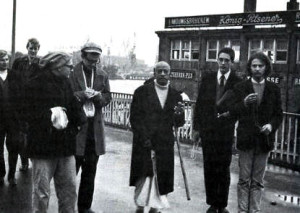Worship spiritual master as God
Speaker: Srila Prabhupada
Source: Planting the seed
 “And now,” he said at length, “I will tell you what is meant by initiation. Initiation means that the spiritual master accepts the student and agrees to take charge, and the student accepts the spiritual master and agrees to worship him as God.” He paused. No one spoke. “Any questions?” And when there were none, he got up and walked out. The devotees were stunned. What had they just heard him say? For weeks he had
“And now,” he said at length, “I will tell you what is meant by initiation. Initiation means that the spiritual master accepts the student and agrees to take charge, and the student accepts the spiritual master and agrees to worship him as God.” He paused. No one spoke. “Any questions?” And when there were none, he got up and walked out. The devotees were stunned. What had they just heard him say? For weeks he had




